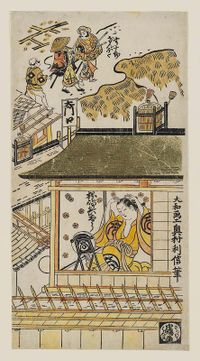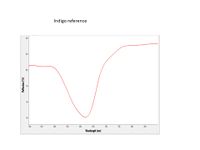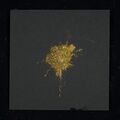Difference between revisions of "Category:Brass: Ukiyo-e colorant"
| (6 intermediate revisions by the same user not shown) | |||
| Line 2: | Line 2: | ||
[[File:SC204072.jpg|right|200px|link=Toshinobu, Actors Matsushima Hyôtarô as the Courtesan Senzai and Nakamura Ujûrô and Nanboku Magotarô as Samurai, 11.13225|Actors Matsushima Hyôtarô... by Okumura Toshinobu]] | [[File:SC204072.jpg|right|200px|link=Toshinobu, Actors Matsushima Hyôtarô as the Courtesan Senzai and Nakamura Ujûrô and Nanboku Magotarô as Samurai, 11.13225|Actors Matsushima Hyôtarô... by Okumura Toshinobu]] | ||
| − | <font size="3">'''[[Brass]]'''</font> 真鍮 (''shinchū''): | + | <font size="3">'''[[Brass]]'''</font> 真鍮 (''shinchū''): Brass is an alloy of [[Copper|copper]] and [[Zinc|zinc]]. During the Edo period, brass was made with domestic copper and imported zinc from China. |
Flakes or powdered metallics are often found in deluxe editions and ''surimono'' prints (摺物). [[Animal glue]] (膠 ''nikawa'') was commonly used to adhere the powder to the paper's surface or as a binder when printed. The use of affordable metals such as brass and [[:Category:Tin: Ukiyo-e colorant|tin]] were likely meant to imitate the glittering effects created by the use of expensive metal leaf or flakes such as gold and silver on screen and scroll paintings. | Flakes or powdered metallics are often found in deluxe editions and ''surimono'' prints (摺物). [[Animal glue]] (膠 ''nikawa'') was commonly used to adhere the powder to the paper's surface or as a binder when printed. The use of affordable metals such as brass and [[:Category:Tin: Ukiyo-e colorant|tin]] were likely meant to imitate the glittering effects created by the use of expensive metal leaf or flakes such as gold and silver on screen and scroll paintings. | ||
| Line 13: | Line 13: | ||
== Examples of Brass in Ukiyo-e Prints == | == Examples of Brass in Ukiyo-e Prints == | ||
| + | |||
| + | {| class="wikitable" style="display: inline-table;font-size:90%;text-align:center;width:15%" | ||
| + | |[[File:11.13225-pt2-detail.png|200px|link=Toshinobu, Actors Matsushima Hyôtarô as the Courtesan Senzai and Nakamura Ujûrô and Nanboku Magotarô as Samurai, 11.13225]] | ||
| + | |- | ||
| + | | | ||
| + | [[File:Indigo FORS.JPG|200px]]<br>[[Toshinobu, Actors Matsushima Hyôtarô as the Courtesan Senzai and Nakamura Ujûrô and Nanboku Magotarô as Samurai, 11.13225|Pt 2: Brass flakes<br>Okumura Toshinobu, 11.13225]] | ||
| + | |} | ||
{|class="wikitable" style="display: inline-table;font-size:90%;text-align:center;width:15%" | {|class="wikitable" style="display: inline-table;font-size:90%;text-align:center;width:15%" | ||
| − | |[[File: | + | |[[File:58.343-pt-detail.png|200px|link=Kiyomasu II, The Arrival of the Elephant, 58.343]] |
|- | |- | ||
| | | | ||
| − | [[File:Indigo FORS.JPG|200px]]<br>[[ | + | [[File:Indigo FORS.JPG|200px]]<br>[[Kiyomasu II, The Arrival of the Elephant, 58.343|Pt 4: Brass flakes<br>Torii Kiyomasu II, 58.343]] |
|} | |} | ||
| + | |||
{| class="wikitable" style="display: inline-table;font-size:90%;text-align:center;width:15%" | {| class="wikitable" style="display: inline-table;font-size:90%;text-align:center;width:15%" | ||
| − | |[[File: | + | |[[File:11.13344-pt6-detail.png|200px|link=Masanobu, Perspective Picture of a Triptych of the Three Evening Poems, by the Authentic Originator of Color Printing and Perspective Prints, 11.13344]] |
|- | |- | ||
| | | | ||
| − | [[File:Indigo FORS.JPG|200px]]<br>[[ | + | [[File:Indigo FORS.JPG|200px]]<br>[[Masanobu, Perspective Picture of a Triptych of the Three Evening Poems, by the Authentic Originator of Color Printing and Perspective Prints, 11.13344|Pt 6: Brass flakes<br>Okumura Masanobu, 11.13344]] |
|} | |} | ||
| + | |||
{| class="wikitable" style="display: inline-table;font-size:90%;text-align:center;width:15%" | {| class="wikitable" style="display: inline-table;font-size:90%;text-align:center;width:15%" | ||
| − | |[[File: | + | |[[File:11.20034-pt3-detail.png|200px|link=Shinsai, Chapters 22–24, from the series The Tale of Genji, 11.20034]] |
|- | |- | ||
| | | | ||
| − | [[File:Indigo FORS.JPG|200px]]<br>[[ | + | [[File:Indigo FORS.JPG|200px]]<br>[[Shinsai, Chapters 22–24, from the series The Tale of Genji, 11.20034|Pt 3: Printed brass<br>Ryūryūkyo Shinsai, 11.20034]] |
|} | |} | ||
| + | |||
{| class="wikitable" style="display: inline-table;font-size:90%;text-align:center;width:15%" | {| class="wikitable" style="display: inline-table;font-size:90%;text-align:center;width:15%" | ||
| − | |[[File: | + | |[[File:11.25669-pt6-detail.png|200px|link=Eisen, Minazuru-hime as Ono no Komachi and Benkei as Kisen Hôshi, from the series Characters from the Life of Ushiwaka as the Six Poetic Immortals, 11.25669]] |
|- | |- | ||
| | | | ||
| − | [[File:Indigo FORS.JPG|200px]]<br>[[ | + | [[File:Indigo FORS.JPG|200px]]<br>[[Eisen, Minazuru-hime as Ono no Komachi and Benkei as Kisen Hôshi, from the series Characters from the Life of Ushiwaka as the Six Poetic Immortals, 11.25669|Pt 2: Printed brass<br>Keisai Eisen, 11.25669]] |
|} | |} | ||
| + | |||
{| class="wikitable" style="display: inline-table;font-size:90%;text-align:center;width:15%" | {| class="wikitable" style="display: inline-table;font-size:90%;text-align:center;width:15%" | ||
| − | |[[File: | + | |[[File:00.1949-pt5-detail.png|200px|link=Hokusai, Ki no Natora and Ôtomo no Yoshio Wrestling, 00.1949]] |
|- | |- | ||
| | | | ||
| − | [[File:Indigo FORS.JPG|200px]]<br>[[ | + | [[File:Indigo FORS.JPG|200px]]<br>[[Hokusai, Ki no Natora and Ôtomo no Yoshio Wrestling, 00.1949|Pt 5: Printed brass<br>Katsushika Hokusai, 00.1949]] |
|} | |} | ||
Latest revision as of 02:02, 19 May 2024
Brass 真鍮 (shinchū): Brass is an alloy of Copper and Zinc. During the Edo period, brass was made with domestic copper and imported zinc from China.
Flakes or powdered metallics are often found in deluxe editions and surimono prints (摺物). Animal glue (膠 nikawa) was commonly used to adhere the powder to the paper's surface or as a binder when printed. The use of affordable metals such as brass and tin were likely meant to imitate the glittering effects created by the use of expensive metal leaf or flakes such as gold and silver on screen and scroll paintings.
Brass flakes are found in early prints as well as in deluxe editions. It was also used for metallic gold colored areas on a print. Printed brass is often seen in surimono prints. Different tones of brass could be created by manipulating the proportion of copper and zinc.
For additional information see: Brass
Examples of Brass in Ukiyo-e Prints
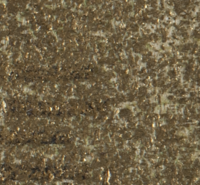
|
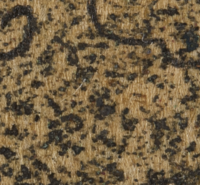
|
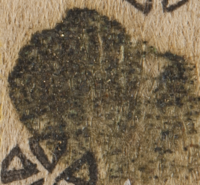
|
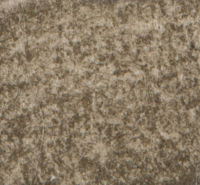
|
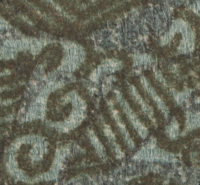
|
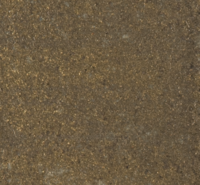
|
Analysis
X-ray fluorescence analysis (XRF) is used to detect copper (Cu) and zinc (Zn), which is an indication for the presence of brass.
Images of Brass
List of Prints
Below is a list of prints where brass was detected.
Pages in category "Brass: Ukiyo-e colorant"
The following 9 pages are in this category, out of 9 total.
B
S
- Shigenobu I, Urashima Tarô, from the series A Set of Five Examples of Longevity, 21.9254
- Shinsai, Chapters 22–24, from the series The Tale of Genji, 11.20034
- Shunman, Mandarin Ducks and Iris, from the series Series of Seven Bird-and-Flower Prints for the Fuyô Circle of Kanuma in Shimotsuke Province, 21.9226
